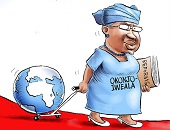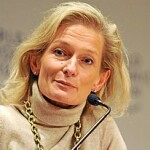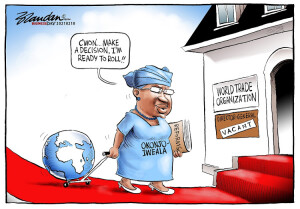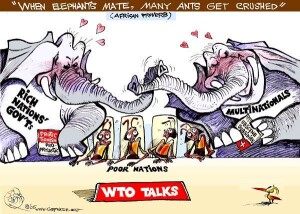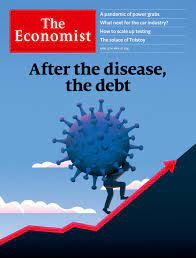As the covid-19 vaccines continue to be rolled out across the world, and as trade disputes continue to fester, Ngozi Okonjo-Iweala has her work cut out for her as the new director-general of the World Trade Organisation (WTO). With many years’ experience in politics, economics, and vaccine production, she already has a deep understanding of the issues.
On June 29, 2021, she spoke with Zanny Minton Beddoes, editor-in-chief of the magazine the Economist, about ending the covid-19 pandemic and the future of globalization.
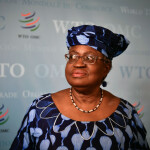 Ngozi described herself as a “trade outsider” when she first began at the World Bank, “which has helped millions out of poverty.” Similarly, she wants the WTO to make a difference.
Ngozi described herself as a “trade outsider” when she first began at the World Bank, “which has helped millions out of poverty.” Similarly, she wants the WTO to make a difference.
However, in some ways the WTO is not in the 21st century, she said, noting it takes years to negotiate multilateral treaties because it makes decisions on a consensus basis. Small countries can stop progress from being made.
During the pandemic, “trade and multilateralism have been front and centre,” Ngozi said. “Medical trade increased by 16 percent; personal protective equipment by 50 percent.” The WTO wants to help monitor supply chains, especially for vaccines.
Her organization is at the centre of the debate over intellectual property (IP). “When the pandemic first began,” she said, “80 countries put trade restrictions in place to prevent helpful goods from leaving their borders. The barriers to free trade are still coming down.” She compared the start of the pandemic, when 109 medical trade restrictions were in place world-wide, to now, when only 53 restrictions remain.
“We nudge behind the scenes, to change behavior, and we shout from the rooftops, to praise,” she said. “We need to do both.”
Beddoes asked if Ngozi was concerned the world would soon split into “the jabs and the jab-nots,” and what role the WTO could play in assuring improved access to life-saving vaccines.
“To address supply scarcity, we need to increase capacity,” Ngozi said. “As well, we need to distribute via the Covax network,” which is a worldwide initiative aimed at equitable access to COVID-19 vaccines directed by the Global Alliance for Vaccines and Immunization (GAVI), the Coalition for Epidemic Preparedness Innovations (CEPI), and the World Health Organization (WHO).
She called on G7 leaders for a stepped-up strategy for 13 billion doses. There are four signatories to the call: the WTO, the International Monetary Fund (IMF), the Organisation for Economic Co-operation and Development (OECD) and the World Bank. Once people are fully vaccinated, they can participate in the economy, and this will increase gross domestic product of every country—as well as the tax revenues from the citizens who will be able to return to work.
“Time is of the essence… these new coronavirus variants may come back and haunt those already vaccinated.” She cited a statistic of 3.6 vaccine doses currently available for every 100 people in Africa. “Our fear is that inequality in vaccines will mean inequality in travel and participation in the global economy.”
Beddoes asked about the WTO agreement on Trade-Related Aspects of Intellectual Property Rights (TRIPS).
Ngozi said this is the most comprehensive multilateral agreement on IP, framing the IP system in terms of innovation, technology transfer, and public welfare. In a nutshell, the problem is to incentivize research and development yet make vaccines affordable for developing nations. “My experience in vaccines shows that if you don’t have IP rights, companies aren’t interested.”
Additionally, supply chains are notoriously complex. “Johnson & Johnson needs 180 components in the supply chain manufacture of its vaccine.” Ngozi said there were lessons from the ravages of HIV-AIDS in Africa. “For ten years, people were dying of AIDS before generic treatments were allowed.” She said, “Nobody should die when we have the technology to save them.” But, taking the long-term view, “if there’s no incentive, who will step forward during the next pandemic?”
Beddoes asked what the WTO will do regarding the China vs. U.S. rivalry. “Is the world dividing itself into economic blocs?”
“That’s precisely what the WTO was created for,” Ngozi replied. “Lots of political issues are now being settled by trade. There’s a feeling that the level playing field is no longer working. But the WTO has a role to play in settling disputes” over things like China’s domestic agricultural subsidies.”
The U.S. has issues with the WTO, and “this was not just part of the Trump era.” She noted the U.S. has never stopped paying its dues. “They know the WTO is important…. All countries, including China, want the WTO to exist.”
Beddoes commented that part of U.S. President Biden’s stimulus package is “goods and services spending in America—and this could be against WTO rules.” In general, there has been a shift to protectionism. How will the WTO handle this?
Ngozi emphasized that every dispute depends on getting concrete facts and monitoring the situation. In some cases, “we need to ask, are the rules fit for purpose?”
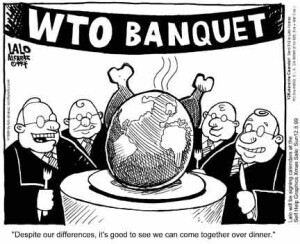 The consulting giant Ernst & Young conducted a survey of CEOs. “At the start of the pandemic, 83 percent of respondents were thinking of ‘re-shoring’ or ‘near-shoring’ but over a year into the pandemic, that number has changed to 20 percent.” Ngozi said, “It’s in the interests of everyone to have multilateral trading.”
The consulting giant Ernst & Young conducted a survey of CEOs. “At the start of the pandemic, 83 percent of respondents were thinking of ‘re-shoring’ or ‘near-shoring’ but over a year into the pandemic, that number has changed to 20 percent.” Ngozi said, “It’s in the interests of everyone to have multilateral trading.”
Beddoes asked, “Can the WTO play a strong role in climate change?”
“We need to do everything we can to reasonably reduce carbon emissions,” Ngozi said, “but we don’t want eco-tariffs to become an additional form of protectionism…. We need global agreements that incentivize low-carbon goods, and that penalize harmful fisheries practices.”
The European Union is leading the world right now. “They have got the message. They plan to have net zero carbon emissions by 2030. She stressed that uneven cap & trade or taxation treatments in one jurisdiction will lead to “carbon leakage.”
Globally, trade has shifted, from goods more to services. The WTO has less purview over services. “It is vital that the WTO have proper rules to underpin e-services and e-commerce.”
Ngozi Okonjo-Iweala outlined the three top WTO priorities are dealing with trade issues related to: 1. the pandemic, 2. the fisheries, and 3. agriculture. When the going gets tough, the tough get going. ♠️

